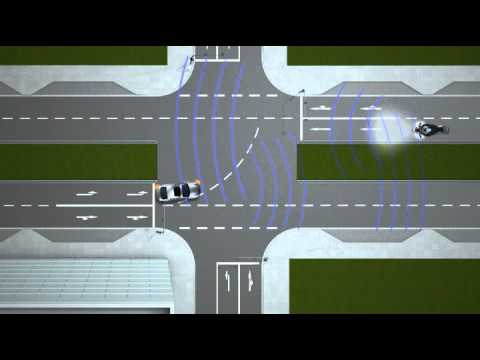The War On Drivers: "Car-To-X" Communication System Testing Begins
California: Appeals Court Approves Cell Phone Search During Traffic Stop
The California Court of Appeal on September 26 approved a police officer’s rifling through the cell phone belonging to someone who had just been pulled over for a traffic violation.
Reid Nottoli was pulled over on December 6, 2009 just before 2am as he was taking a female friend home. Santa Cruz County Deputy Sheriff Steven Ryan said Nottoli’s silver Acura TL had been speeding on Highway 1. After speaking with Nottoli on the side of the road, Ryan suspected the 25-year-old was under the influence of a stimulant drug. His license was also expired, so Ryan said he would impound the vehicle. Nottoli asked if his car could stay parked on the side of the road, which was not heavily traveled and out of the way. Ryan refused so that he could conduct an “inventory” search prior to the towing.
Ohio Appeals Court Strikes Down GPS Vehicle Spying
Although the US Supreme Court is expected to settle the issue of GPS tracking of motorists soon, a three-judge panel of the Ohio Court of Appeals, Fifth District ruled 2-1 earlier this month against the warrantless use of the technology. The majority’s decision was likely designed to influence the deliberations of the higher courts. On November 8, the US Supreme Court will hear oral arguments in the GPS case US v. Jones. The Ohio Supreme Court is also considering Ohio v. Johnson in which the Twelfth District appellate court upheld warrantless spying.
The present case began on January 14, 2010, when Franklin County Sheriff’s Department Corporal Richard Minerd’s investigation of a burglary brought him to a white Honda Civic in an apartment complex. Minerd slapped a battery-powered GPS tracking unit under the bumper that allowed real-time tracking of the vehicle’s location, speed and direction of travel. Minerd did not seek a search warrant before acting.
Constitutional Rights Group Challenges Warrantless GPS Tracking
A powerful group of political figures issued a report last week condemning law enforcement’s unchecked use of high-tech surveillance system. The Constitution Project is troubled in particular by the ease with which a person’s movements can be tracked 24 hours a day. The conservative-leaning group insisted on the need to bring the law back in line with fundamental constitutional principles.
“Private sector technologies that enable constant monitoring of individuals are moving inexorably forward, and as they are developed, law enforcement agencies inevitably seek to use these new surveillance tools,” the report stated. “These include not only GPS devices and cell phones, but also laptop and notebook computers, location based services like OnStar, and technologies yet to be developed. Use of these surveillance devices presents serious challenges in terms of compliance with Fourth Amendment protections. While these technologies enhance the ability of law enforcement agents to accomplish their important work, it is also critical that we carry forward Fourth Amendment safeguards into the Digital Age.”
GM Drops Proposed OnStar Policy Changes
Under attack from privacy advocates and US Senators, Onstar will be dropping plans to automatically track vehicles that are not subscribed to its service, and will make post-cancellation tracking an opt-in option, rather than opt-out. A GM statement reads:
DETROIT – OnStar announced today it is reversing its proposed Terms and Conditions policy changes and will not keep a data connection to customers’ vehicles after the OnStar service is canceled.
OnStar recently sent e-mails to customers telling them that effective Dec. 1, their service would change so that data from a customer vehicle would continue to be transmitted to OnStar after service was canceled – unless the customer asked for it to be shut off.
“We realize that our proposed amendments did not satisfy our subscribers,” OnStar President Linda Marshall said. “This is why we are leaving the decision in our customers’ hands. We listened, we responded and we hope to maintain the trust of our more than 6 million customers.”
If OnStar ever offers the option of a data connection after cancellation, it would only be when a customer opted-in, Marshall said. And then OnStar would honor customers’ preferences about how data from that connection is treated.
Maintaining the data connection would have allowed OnStar to provide former customers with urgent information about natural disasters and recalls affecting their vehicles even after canceling their service. It also would have helped in planning future services, Marshall said.
“We regret any confusion or concern we may have caused,” Marshall said.
Senators Franken And Coons Question OnStar Over New Policies
Editor’s note: When I wrote about OnStar’s latest round of privacy concerns, I didn’t realize that the chairman of the Senate Judiciary subcommittee on privacy, technology and the law had voiced his own concerns in a letter published just the day before. Here is the letter, as published at Senator Franken’s website. OnStar has already said it will respond to specifically to the concerns of Senators Franken and Coons.
Ms. Linda Marshall, President
OnStar Corporation
400 Renaissance Center
Detroit, MI 48265
Dear Ms. Marshall:
We are writing to express our serious concern with OnStar’s announcement earlier this week that it would continue to track the GPS locations of its customers’ vehicles even if those customers have affirmatively ended their contractual plans with OnStar. In this email announcement, OnStar informs its current and former subscribers that it reserves the right to track their locations “for any purpose, at any time.” It appears that the only way to stop this tracking is to actually call OnStar and request that the data connection between OnStar and the vehicle be terminated; this service is not available online. OnStar further reserves the right to share or sell location data with “credit card processors,” “data management companies,” OnStar’s “affiliates,” or “any third party” provided that OnStar is satisfied that the data cannot be traced back to individual customers. See OnStar, Privacy Statement: Effective as of December 2011. In a nutshell, OnStar is telling its current and former customers that it can track their location anywhere, anytime—even if they cancel their subscriptions—and then give or sell that information to anyone as long as OnStar deems it safe to do so.



















Recent Comments